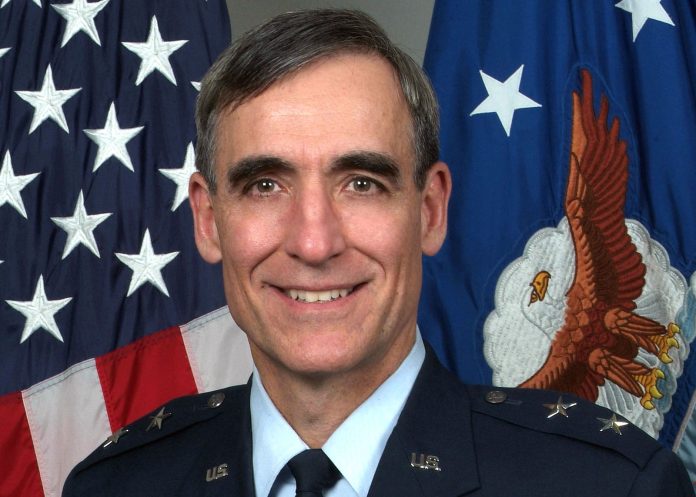Yesterday morning Mayor Jenny Durkan announced she had hired retired Air Force Major General Michael Worden to a newly created position–Director of Citywide Mobility Operations Coordination–at a salary of $195,000. After his 30-year military career, Worden worked as a defense contractor for Lockheed Martin for six years until switching to consulting in 2016. He has no direct transportation experience.
The Mayor framed the position as being highly responsive to the Period of Maximum Constraint, an era of anticipated traffic challenges kicking off with the Alaskan Way Viaduct closure on January 11th–it’s also been dubbed the Seattle Squeeze.
“[The viaduct closure] marks the beginning of a period of significant mobility challenges that will require coordinated, efficient response that delivers for the people of Seattle,” Mayor Durkan said in a statement. “With his decades of experience in planning, operations and fast-changing periods of uncertainty, General Worden will help ensure we are meeting the challenge for the public, freight mobility and critical services like public safety.”
Of course, the Mayor had just announced her selection of a permanent director of the Seattle Department of Transportation (SDOT) last month, choosing Sam Zimbabwe, Project Delivery Manager at Washington D.C. Department of Transportation. Worden was a finalist for the SDOT director position and finished in the top three, according to Crosscut.
“I talked to Sam at length when he was hired about the focus that SDOT needed and what we needed to be doing during the Period of Maximum Constraint, and he was very much in favor of having a person who would coordinate across departments, because this isn’t just SDOT.” Mayor Durkan said during a press conference yesterday. “It affects the Seattle Fire Department, Seattle Public Utilities, Seattle City Light, Seattle Police Department. So we need one person at the cabinet level who can coordinate every single one of the agencies so that the people of Seattle know that we’re doing everything we can during this very difficult time.”
Hiring the runner up is becoming a bit of a pattern for the Mayor, as she also hired Cameron McLay as a consultant to oversee police reform after he finished second behind Seattle Police Department Chief Carmen Best for the top job.
Reporters pressed Mayor Durkan about whether hiring Worden would be taking power away from Zimbabwe, but she insisted it wouldn’t.
“The new SDOT director will run SDOT,” Mayor Durkan said. “The general is going to be the point of contact for coordinating the City-wide response involving 29 departments for the Period of Maximum Constraint.”
The Seattle City Council still must confirm Zimbabwe as SDOT director, but, as a cabinet hire, Worden avoids the same scrutiny, and in fact he already started and joined the City payroll on January 2nd.
Worden will be based out of the City’s Emergency Operations Center, which the Mayor’s press release explains will be “so he has access to necessary centralized communications and technology assets for real-time coordination.” Presumably, Worden would direct the deployment of the City’s rapid response collision wreckage clearing equipment, which the Mayor has publicized as needed preparation in the run-up to the Seattle Squeeze.
Moreover, the role will coordinate numerous agencies: “Worden will be the single point of contact for ensuring the City’s 29 departments have a coordinated response to new mobility challenges and impacts to department operations, including managing the right of way, conducting incident response, and ensuring the continued delivery of emergency services. He will also help ensure the City is working closely with partner agencies on operations and planning.”
Senior Deputy Mayor Michael Fong will oversee his day-to-day work, the Mayor’s Office said. This raised the question why Deputy Mayor Shefali Ranganathan would not oversee the new traffic czar since she is the deputy mayor tasked with transportation–Erica Barnett asked just that question at the press conference.
“This isn’t just about transportation,” Mayor Durkan responded. “Again this is about a response about 29 departments. And Senior Deputy Fong is the senior deputy mayor so he actually reports to me, but he coordinates with Senior Deputy Fong.”
General Worden himself has yet to make a public appearance, but the Mayor’s Office says he will be involved in public outreach going forward.
“While Seattle faces significant mobility and traffic challenges, Mayor Durkan’s vision for the future is both compelling and a call to action,” Worden said in a statement. “I look forward to working with the Mayor as well as my City and regional colleagues to help address the complex challenges and ensure a coordinated response that advances safety and mobility.”
Meanwhile, the Move All Seattle Sustainably coalition is still pressing the City to add more bus lanes, bike lanes, and signal priority for pedestrians to deal with the Seattle Squeeze, but has gotten no assurances beyond the four temporary bus lanes recently announced. Adding more bus lanes wouldn’t be that hard nor that expensive. For now, though, Seattle will have to settle for the hiring a two-star general as traffic czar at an expense of a quarter million dollars per year as qualifying for ‘we’re doing everything we can.’
Doug Trumm is publisher of The Urbanist. An Urbanist writer since 2015, he dreams of pedestrian streets, bus lanes, and a mass-timber building spree to end our housing crisis. He graduated from the Evans School of Public Policy and Governance at the University of Washington in 2019. He lives in Seattle's Fremont neighborhood and loves to explore the city by foot and by bike.


